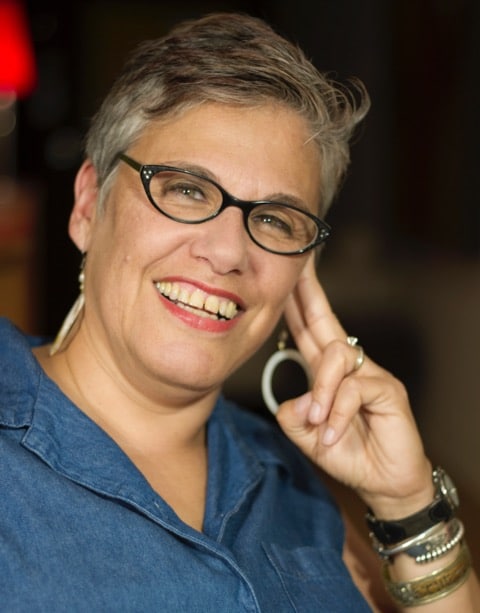Welcome to The Converse-Station: A dialogue between writers. With the site getting so much traffic (my Facebook page is reaching over 18 million people) I can think of no better way to utilize that traffic than to introduce the readers to writers I love. The dialogues created within this series have stayed with me long after I’ve read them on the page. Enjoy. xo Jen Pastiloff
By Megan Devine
Jessica Handler and I have been following each other around. We belong to secret societies of writers together, and we quote each other to our respective students, me in my Writing Your Grief courses, and Jessica in her Writing the Tough Stuff workshops. Her book, Braving the Fire: A Guide to Writing About Grief and Loss, helps writers make the often-arduous shift from writing personal things to writing personal things that resonate with the larger world story. So it only made sense when the editors of The Manifest-Station asked whom I might interview for the Converse-Station: Jessica was my first and only choice. We share a fierce love not only for well-told stories of love and loss, but for the evolution of craft we see in our students. What follows is an excerpt of a much longer – and more heavily laden with expletives – video discussion we had earlier this year on what it takes to teach, and to write, with both skill and sensitivity.
Jessica Handler: So you and I have been online friends now for a year probably.
Megan Devine: I think so.
JH: Yeah. This is cool. Well, you are who I thought you would be. You look like who I thought you would be. You sound like the person I imagined.
MD: I think that’s good.
JH: Yeah, it is good. It’s nice when someone you’ve been reading turns out to be exactly who you think they are. So what are we doing together today?
MD: We’re talking about writing. Specifically, we’re talking about the practice and process of writing about grief and loss.
JH: Well cool, I’m a big fan of The Manifest-Station. I know about it because I’m a fan of Emily Rapp, and I think Emily has been involved a fair amount. That’s how I got introduced to TMS, and I follow it, so this is fabulous.
MD: Yeah, it’s pretty fantastic.
JH: And this interview is giving me a break from grading papers, so God bless you for calling.
MD: This is my break from reading, too. I just opened a new writing session, and it’s only day two, so this is my break from reading all of the new students. I take the first several days just to hear their voices, get to know their stories.
JH: You’re talking about your Writing Your Grief course, right? Man, I remember being part of that. It was amazing to watch, during the session I was in, to read all of their words. And you, you just hold this space for all of them. And that’s something that we should talk about in terms of teaching the material we teach. People have asked me about how we handle all that pain, when one teaches writing about grief or trauma, which we both do. I mean, we’re not doing counseling sessions here. How do you take care of yourself in the face of all that pain? We ask our students to write about places that hurt. How do we make that separation from drowning in other people’s very legitimate issues when we can’t live this way all the time – we can’t just keep our eyes on that pain constantly.
MD: Yeah. It’s a really tricky balance. I can’t spend 5 and 6 hours inside my students’ words the way I used to. I have to do it in smaller chunks.
JH: As teachers, and also as witness to other peoples’ pain through their writing, how do we parcel this out, break things into chunks? I work really hard to do that. I also make sure that students know that I’m not a therapist. It’s like – I understand how you feel, believe me, but I’m not here to be your therapist and to have you rant and rave about that time that you or so and so did that thing. We’re in an interesting quandary with this, I think. We want to allow students their own truth, and give them space for their voice, but I can’t let a writing course become group therapy. It can’t be a place where they just vent and process. I don’t know about you. I just make that distinction very, very clear in every class. How do you do this?
MD: It’s a little bit different for me, because I am a therapist. But when I’m teaching writing, I’m not primarily in there as a therapist, and the writing courses aren’t therapy. One of the things you and I do, in our respective courses and workshops, is make these really safe spaces. We make these containers to hold so much pain, so much grief, so much story. Even without it becoming group therapy, how do you care for yourself in that? How do you care for yourself, being the one who maintains the container for others?
I moved to a new state last year, and I’m meeting all these new people. These new people ask me what I do, and I tell them I write, teach, and counsel on out of order death – accidents and illnesses that shouldn’t happen. Their faces fall. They stammer for a moment, and then invariably say things like, “I couldn’t do that. How do you listen to that all day long?” That’s a legitimate question. What do you do as a holder of space?
JH: I’ve asked my therapist this too, about her job, and her life, when you listen to people all day long, some of whom make you crazy and some of whom really resonate with you – how do you go home and not take it out on your partner, your dog, your cat, yourself? Honestly, I forgot what she told me. I don’t know. How do I do it? I make very sure in workshop that people understand that we’re here to talk about the craft of writing: to work with the sentences, the metaphors. I have to repeat that a lot, depending on the people in the workshop. Sometimes I find that the thing that really hits the hardest is when we do a free write, or we do something where they dig really deep. They come up from that writing and they’re a little shaken. That’s fine. That’s what I want. If people cry or if they go oh my God I didn’t realize that this was about that, that’s good. I use time for people to step out, to take breaks once they’ve found something deep. I’ve found that everybody who’s in these writing workshops is very helpful and comforting to each other, but they respect the limits of the space.
In most cases people come to me wanting to write, but I have had some people who seem to come to me needing an ear. And you and I have some different roles, but that’s not what I’m really there for. It’s not a place for processing grief itself. I’ve been in one situation where I’ve asked someone to leave. In a polite way I had to say, “I don’t think you’re ready for this right now.” Just because we’re writing about grief doesn’t mean this is the place for all of your grief. We’re talking about writing. I teach writing.
I think if I keep pushing that, and making those parameters really clear, that helps me and it helps them. Particularly if I’ve got ten people and nine of them want to write, but one just needs to cry or process. They are very appreciative of my holding that space, keeping it well-boundaried and focused on the craft. It helps me too because… well, just recently I was reading again from Invisible Sisters. I’ve gotten used to reading from it, but because my mom just died a year and a half ago, the section where I talk about what would happen when my parents age suddenly became newly difficult. Here my mother is gone, she’s already aged, and died. That passage in Invisible Sisters became hard to read. My work still affects me. So to do it, to read it without falling into my own actual sadness, I create a hologram of myself in my head. Does that make sense?
MD: Absolutely.
JH: It’s the person, it’s a performative me as opposed to the me, me.
MD: Yeah, there’s a hybrid there where what you’re speaking is true and it’s your truth. You view it from a practiced distance so you can use your voice. In a sense, you have to step out of the story so you can tell the story. Continue Reading…









